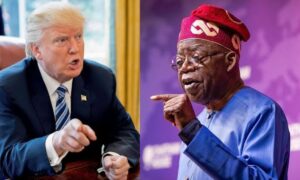
Nigeria’s refusal to accept asylum seekers from the United States is partly responsible for the recent visa restrictions imposed on the country by President Donald Trump.
The request is a part of broader demands from the Trump administration, which are being negotiated.
Diplomatic sources say, the US president has been putting pressure on many countries to serve as temporary homes for asylum seekers until their cases are treated, and this usually takes up to seven years.
While some countries have agreed, Nigeria has refused to be part of the arrangement.
Trump typically raises the bar in negotiations by slamming very high penalties on the other party until he gets the better part of the bargain.
He has been applying this strategy in his tariff war with a number of countries.
The US embassy had announced on Tuesday a reduction in the validity period and entry allowance for “most” non-immigrant and non-diplomatic visas issued to Nigerians, effectively limiting the legality of their stay in the US to three months with a single entry.
An alleged imbalance in visa reciprocity from Nigeria was cited on social media as reason for the hard-hitting penalty, although the exact details were not made public by the US.
The Federal Government of Nigeria denied the imbalance, maintaining that no restrictions were placed on issuance of visas to the US citizens.
The announcement came as a shock to Nigerians and there were claims — now confirmed to be false — that Nigeria caused the policy change by stopping to issue five-year visas to American citizens.
A physical embassy-issued Nigerian visa for US citizens still has a validity that ranges from three months to five years, with either single or multiple entry — depending on the visa category.
Nigeria introduced its e-visa on March 1, aiming to make the process more accessible by eliminating the need for embassy visits and the highly poorly managed visa on arrival.
The e-visa is valid for 90 days from the date of issuance and allows single entry into Nigeria with a maximum stay of 30 days.
The changes were not limited to US citizens as they affected all non-ECOWAS nationals requiring visas to enter Nigeria.
However, the US does not offer such a visa category to Nigerians despite the reciprocity agreement.
Diplomatic sources affirmed that the bone of contention is beyond the non-existent gaps in visa reciprocity.





